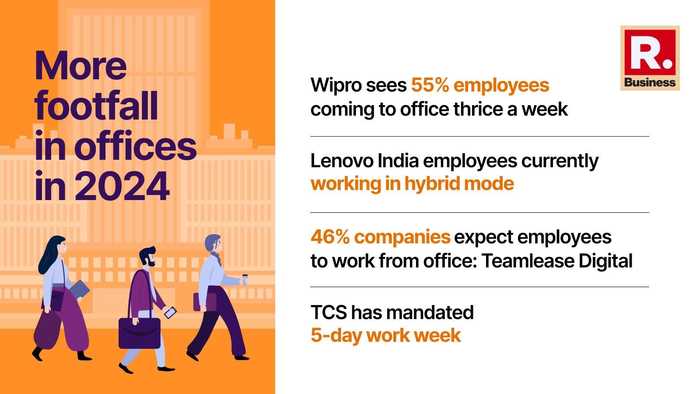Published 12:11 IST, January 5th 2024
55% in Wipro turning up to office thrice a week: Is remote work over?
While several IT companies have ended work from home, others have continued it for cost-cutting. What are the implications of this on-and-off trend?

Home no longer office: Working from home is off the cards for IT cos and several other industries, as leaders emphasise the importance of returning to the office. Indian IT companies are calling employees back from hometowns, with Tata Consultancy Services (TCS) ending hybrid work for employees in October last year. Wipro and HCL have also mandated a three-day work week in November.
Responding to Republic Business, Wipro said more than half of the workforce is turning up three days in office since the November 2023 mandate to work from office.
Wipro's WFO Take
“Since the onset of the pandemic, Wipro has adopted a flexible workplace approach, with the goal of prioritising the well-being of our employees while aligning to our clients’ evolving needs and ensuring our talent’s professional growth,” Wipro said.
Since May of 2024, the soaps-to-software company has been encouraging employees to work from the office three times a week.
“This approach has afforded our employees the flexibility of remote work while allowing our teams to exchange ideas and experiences in real-time, build stronger relationships at work, and access new opportunities through expanded networks,” the IT multinational added.
Currently, approximately 55 per cent of our employees are coming to the office three days a week, Wipro said.
Shedding light on the post-pandemic workplace scenario, Wipro said, “Recognising the immense benefits of in-person collaboration and innovation, we are now taking the next step in our workplace policy evolution and requiring all employees to work from the office three days a week, effective November 15, 2023.”
The company added that in-person interactions are critical to the professional development of talent, “as well as to our success in driving ongoing innovation for clients. We look forward to welcoming all our employees to the office."
Why not remote?

Source: Pexels
The three-day work from office for TCS employees was scrapped, mandating them to come back to the office 5 days a week, as per a September mail. TCS did not officially comment on the matter.
Amid moonlighting while working from home during the pandemic, IT companies including Wipro had strongly mandated employees against the trend.
Infosys and HCL have also mandated a three-day workweek.
HCL CEO and Managing Director C Vijayakumar told PTI in October that remote working in perpetuity “is not a good idea at all.”
Bhavya Misra, Director and Head of HR, Lenovo India said most of the Lenovo India employees are under hybrid work models.
Outlook in 2024

Source: Pexels
Work from office (WFO) will be preferred by all industries in 2024, according to Sunil Chemmankotil, CEO, TeamLease Digital.
“Almost 46 per cent of companies expect employees to WFO including Manufacturing, BFSI and Retail, compared to 32 per cent of hybrid and 16 per cent of WFH choices,” the staffing company shared.
Essential services, as well as manufacturing, retail and logistics roles, were on-ground even during a pandemic, but IT companies and other white-collar roles across startups, the media industry and the like saw extended work-from-home, and later hybrid working arrangements.
Siva Prasad Nanduri, CEO of Noida-based Diensten Tech Limited said the trend has extended beyond initial anticipation and leads to challenges in maintaining work-life balance.
“Although remote work or hybrid models present numerous benefits such as flexibility, cost savings, and heightened productivity, they've also led to amplified mental fatigue and challenges in maintaining work-life balance,” he said.
What Triggered the Callback

Source: Pexels
The pandemic triggered a knee-jerk reaction to the idea of working from home most days, but even as flexibility is exhibited - employees cannot misuse it, according to Neeti Sharma, President and Co-Founder at TeamLease Edtech Limited.
“A lot of technology companies had a work-from-home policy even before the pandemic, amid satellite offices and global teams with multiple shifts. It was predicted that 80 per cent of IT professionals will not return to offices, but this was not the case.” she shared.
Employees should at least be near the base location of their workplace to come to the office when required, she added, saying that the total cost to company goes down by 20 per cent in case an employee opts for remote working since infrastructure and travel costs is omitted.
Emphasising on the importance of returning to office, she said, “Several homes do not have proper infrastructure or a quiet place with internet. Employees, even freelancers end up going to cafes for meetings and work. 9 to 10 hours in the office prove to be more productive than 15 hours working from home.”
Who are still working from home?

Source: Freepik
Notably, Cognizant is among the few IT companies offering extended work from home, joining American players like Spotify. But Google, and more aggressively X, have called employees back - with employees in X sleeping in the headquarters.
Several companies anticipate another wave of COVID but feel ready for remote working and hybrid transitions.
Kavita Singh, CHRO of Runaya said, “Looking at the current rise of COVID-positive cases across the county we have implemented COVID leaves.”
HR Stance on Office-Remote Tug

Source: Pexels
The decision to end or continue remote work depends on various factors, including job nature, company culture, and individual preferences, according to Sourabh Deorah, Co-Founder & CEO of Advantage Club, an employee engagement platform.
Communication with colleagues is crucial to prevent a disconnect, and creating a separation between work and personal life can be difficult but necessary, he added.
Cloud-based HR software company Keka said 2023 may have marked the return to the office era, but WFH is far from obsolete.
“There is a tug of war between in-person collaboration and freedom. But, with virtual collaboration tools, automation services including those for recruiting, telehealth services and digitalisation, in general, taking the centre stage, a lot of companies in the country have gone completely remote, with no traditional brick and mortar offices,” Jayati Pardhy, HR Head at Keka said.
Turning off the WFH toggle is not an option as it can help balance business goals and employee well-being, she added.
Updated 15:24 IST, January 5th 2024




